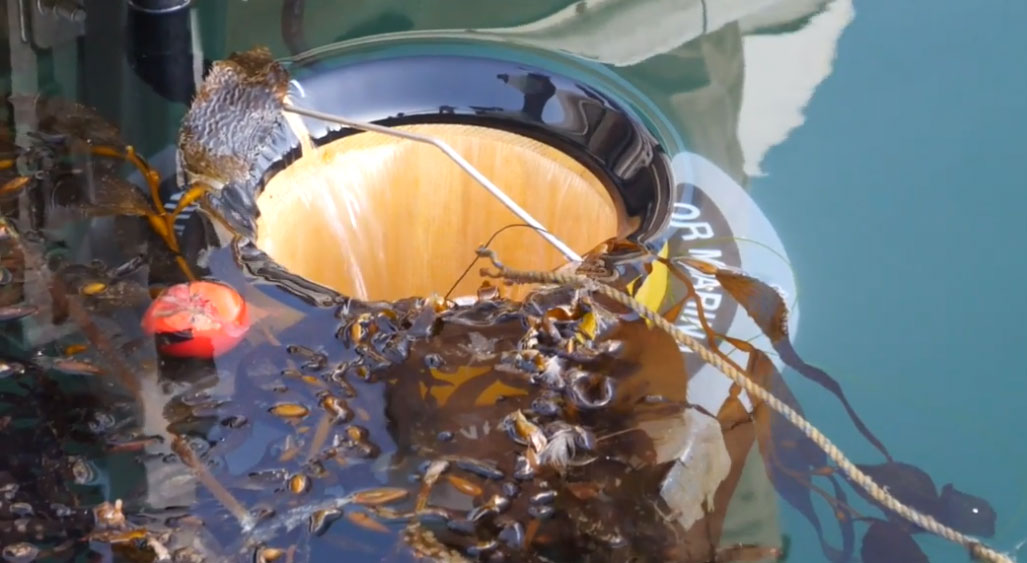- Topics
- Campaigning
- Careers
- Colleges
- Community
- Education and training
- Environment
- Equality
- Federation
- General secretary message
- Government
- Health and safety
- History
- Industrial
- International
- Law
- Members at work
- Nautilus news
- Nautilus partnerships
- Netherlands
- Open days
- Opinion
- Organising
- Podcasts from Nautilus
- Sponsored content
- Switzerland
- Technology
- Ukraine
- United Kingdom
- Welfare

'If you can have bins on land, then why not in the water?' That, says Pete Ceglinski, was the thinking behind the Seabin, the marine waste-gathering system he created with his friend Andrew Turton.
Both keen surfers and leisure sailors, they co-founded the Seabin Project because they were dismayed by the amount of rubbish building up in the oceans, and have spent the last three years developing and piloting their cleanup product.
Now CEO of the Mallorca-based company, Pete has a background in product design and boatbuilding for the yacht racing sector, so his expertise was invaluable in the development of the Seabin. The device is designed to be moored in a marina or port, sitting just under the waterline, with a pump at the bottom to pull in floating debris. This is then trapped in the bin until it can be emptied by local refuse services and the waste processed onshore.
‘The trick is to place the Seabin in debris accumulation corners – and everyone working in a marina or port knows where those are,’ says Pete. ‘One of the most common things captured by the bins is plastic bags, but we also trap microplastics down to 2mm in diameter, and there are oil pads which are very effective at absorbing surface oil. And if a piece of debris is too large to be pulled over the rim into the bin, the suction from the bin’s pump will keep it held against the side until it can be retrieved.’
Another design consideration has been the need for the Seabin to move up and down with the tide so its rim is always under the waterline. During the pilot phase, this has been achieved by mooring the device to floating docks, but later this year another model will be launched, suitable for fixed docks. This version will be attached to a vertical rail attached to the dockside, and will slide up and down the rail with the tide.
To operate its pump, the Seabin needs to be connected to mains electricity, but is designed to use as little power as possible. In future, the company hopes to enhance the product’s green credentials by operating each unit with a renewable power source such as a wind turbine or solar panels, and by increasing the percentage of recycled plastic in its manufacture.
The Seabin Project was started with the help of crowdfunding, and received a major boost when it won a grant for environmental startups from the Netherlands-based Booking Cares Fund. An important partner in the pilot phase has been the engine and ship systems manufacturer Wärtsilä, which became involved as part of its corporate commitment to the marine environment. Wärtsilä has sponsored Seabins in three ports in Finland, and plans to continue buying the device for ports in each of the countries where it has operations internationally. Other companies in the pilot include Pete’s former UK employer, the yacht racing team Land Rover BAR.
Having successfully turned out hundreds of prototypes, the French yacht builder that manufactures the Seabin is gearing up for full commercial operation this spring. Pete would welcome approaches from more partners in the commercial shipping sector, especially those who could help with worldwide logistics. This project represents a break from the traditional narrative of environmental campaigning versus profit, he stresses. 'There is no enemy – we should all work together.’
Find more about the Seabin Project in the video. To enquire about becoming a partner, visit the Seabin Project or email contact@seabinproject.com.
Follow this story
-
Environment
21st century plague
- Telegraph
- 29 March 2018
-
Environment
Convincing ferries to cut plastic waste
- Telegraph
- 29 March 2018
-
Environment
Seabin Project – trapping floating plastics in port
- Telegraph
- 29 March 2018
-
Environment
Ocean Cleanup – tackling the plastic problem on the high seas
- Telegraph
- 29 March 2018
-
Environment
GreenSeas Trust – binning plastics on the beach
- Telegraph
- 29 March 2018
Tags
